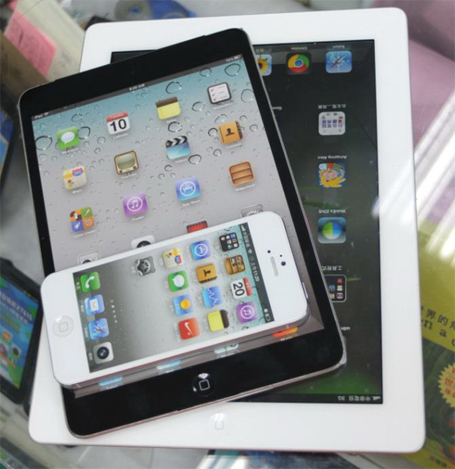It’s far from a secret by now that Apple Inc. plans to release an iPad Mini by the end of the month.
According to supposed leaks reported by 9to5Mac, Apple will launch the new junior-sized tablet at an Oct. 17 event and it will feature a 7.85 inch screen. The new version of the iPad is thought to be a move by Apple to compete with other recent smaller tablet launches in the 7-inch screen size and $200 price range. Those tablets are mostly Android-based, including the Google Nexus 7, Amazon’s Kindle Fire HD, and Kobo’s Arc.
Expected to hit store shelves by November, the unique screen size will have prospective tablet buyers scratching their head during the holiday season. What’s the best screen size to buy? Putting important factors such as operating system, hardware specs, and apps aside, the screen size can be a critical factor in how productive you are with your tablet. Hayley Tsukayama rounds up some of the main differences between screen sizes in the Washington Post, and here’s some key points to keep in mind:

A mock-up compares the iPad mini screen size to the current iPad and iPhone. (Photo: 9to5mac)
Compact (5 inches size)
Often referred to as “phablets” some smartphones have been testing the upper limits of screen size to still be considered a phone. Even Apple is jumping on the bigger screen bandwagon, upping the iPhone 5 to a 4-inch size. The Samsung Galaxy Note II is a whopping 5.5 inches across, making it a bit strange to hold up to your ear to make calls with. But it does make it easier to graze content with that big screen.
If you really want an extremely portable, one device to do everything solution, this might be your best bet. Phones around 5-inches in size will still slip into your pocket, but offer you enough screen real estate to make reading easy and also more inviting for creating documents. Connect a Bluetooth keyboard and you could really get some work done.
Mid-range (7 to 8-inch screen size)
The next step up is for users looking for a tablet that is more separate from the smartphone experience. The seven-inch form factor has been very popular for tablets, with countless Android tablets released in this size, and the BlackBerry PlayBook. Apple is expected to join this crowd with a 7.89-inch screen size on the iPad mini.
Although a 7-inch screen size sounds pretty close to 10 inches, remember this metric represents just the diagonal length of the screen. The actual square inches of area offered by the screen is about half of a 10-inch tablet. While 7-inch tablets won’t quite fit into your pocket, they are easy to slip into a purse or a brief case. You may find reading content on this size very comfortable, but less so for creating documents.
Large (10 to 13 inch)
The most popular selling screen size for tablets, thanks to the iPad’s 10.1-inch size, is this category. Its smaller and more portable than a laptop, but still requires an additional bag to really lug around conveniently. (Or if you’re shameless about looking dorky, you can get the GoPad, which allows you to prop the iPad on your belly for hands-free use and transport.)
If you’re a tablet power user that will be doing some activities like document creation or photo and video editing on your device, you’ll probably want the extra screen real estate. Look out for the new Windows 8 hybrid tablets that will be coming sizes ranging from 10 inches to 13 inches. They will offer keyboard docks that extend functionality by adding extra ports and battery life in addition to those physical keys.
Super size (20 inches)
At this size, it’s less of a tablet and more of a table-top PC, but Sony’s Vaio Tap 20 is basically an oversized tablet. It’s not likely you’ll be transporting this with you wherever you go, but the form factor does make this all-in-one-PC easy to transport around the house or office.




 Brian Jackson is the Editor at ITBusiness.ca. E-mail him at
Brian Jackson is the Editor at ITBusiness.ca. E-mail him at 